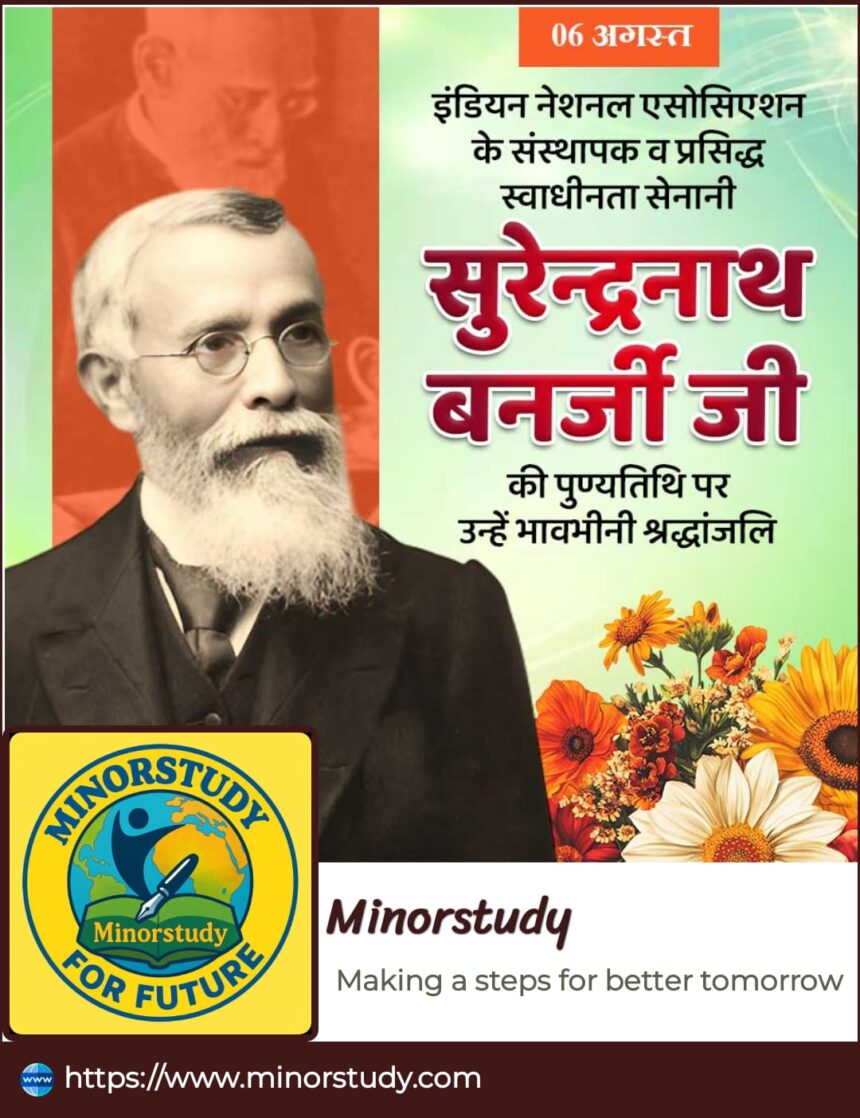🇮🇳 7 Inspiring Truths About Surendranath Banerjee That Every Indian Must Know
In the pages of India’s pre-independence history, where bravery, intellect, and oratory shaped the nation’s destiny, one name stands tall — Sir Surendranath Banerjee. He was not just a leader or a freedom fighter — he was a visionary, educator, journalist, and a true symbol of India’s awakening.
- 📜 Introduction: Who Was Surendranath Banerjee?
- 🕰️ Timeline: Life Journey of Surendranath Banerjee
- 🧠 7 Inspiring Facts About Surendranath Banerjee
- 1. He Was Among the First Indians to Crack the ICS Exam
- 2. He Believed in Constitutional Nationalism
- 3. He Was the Father of Indian Political Journalism
- 4. He Inspired Public Agitation Long Before Gandhi
- 5. He Founded One of India’s Oldest Colleges
- 6. He Opposed the Partition of Bengal
- 7. He Was Knighted – And Criticized For It
- ❓ Frequently Asked Questions (FAQs)
- Q1: Why is Surendranath Banerjee considered a nationalist pioneer?
- Q2: Was Surendranath Banerjee a freedom fighter?
- Q3: What is Surendranath Banerjee’s legacy today?
- 📚 Historical Significance in Indian Society
- 💭 Observance and Remembrance
- 🌟 Key Lessons from Surendranath Banerjee’s Life
- 🎉 Wishing Message
- 🧬 Importance in Our Daily Lives
- 💥 Why He’s Important to Society Today
- 🧾 Conclusion: The Forgotten Torchbearer
- 🔍 Related Our Articles
This detailed article will walk you through his life, contributions, timeline, facts, FAQs, significance in our daily lives, his message for modern India, and why his memory matters to society today. If you’re interested in learning more than just textbook facts, and want to know how a single man ignited minds, you’re in the right place.
📜 Introduction: Who Was Surendranath Banerjee?
Surendranath Banerjee (1848–1925) was one of the earliest political leaders of modern India. Often referred to as the “Indian Burke” (after the British statesman Edmund Burke), he laid the foundation for the nationalist movement much before the likes of Mahatma Gandhi or Nehru entered the scene.
📍 Born: 10 November 1848, Calcutta (now Kolkata), West Bengal
🎓 Educated at: University of Calcutta, and then ICS (Indian Civil Service), London
🏛️ Founded: Indian National Association (merged later with INC), Ripon College (now Surendranath College)
🗞️ Editor: Newspaper The Bengalee
🗣️ Nickname: “The Voice of Bengal”
🕰️ Timeline: Life Journey of Surendranath Banerjee
| Year | Event |
|---|---|
| 1848 | Born in Calcutta in an upper-caste Brahmin family. |
| 1868 | First Indian to pass the ICS exam (but was later dismissed on technical grounds). |
| 1876 | Founded the Indian National Association — a precursor to Indian National Congress. |
| 1879 | Became a professor at Presidency College. |
| 1883 | Imprisoned for contempt of court — this sparked public protests, a rare event at the time. |
| 1885 | Played a major role in the early sessions of the Indian National Congress. |
| 1905 | Led protests against the Partition of Bengal. |
| 1918 | Knighted by the British Government — creating controversy among fellow nationalists. |
| 1921 | Appointed as Minister of Local Self-Government in Bengal. |
| 1925 | Passed away, leaving behind a powerful intellectual and political legacy. |
🧠 7 Inspiring Facts About Surendranath Banerjee
1. He Was Among the First Indians to Crack the ICS Exam
At a time when Indians were discouraged from competing with the British, Banerjee succeeded in entering the Indian Civil Service in 1869. Though he was later dismissed on a legal technicality, it inspired generations of Indian youth to challenge colonial supremacy.
2. He Believed in Constitutional Nationalism
Unlike revolutionaries who wanted direct armed conflict, Banerjee advocated for dialogue, reform, and the use of British constitutional methods. His belief in gradual reform and education laid the groundwork for the future Congress ideology.
3. He Was the Father of Indian Political Journalism
Through his newspaper, The Bengalee, Banerjee enlightened the masses, criticized British policies, and encouraged political thought in common citizens. He showed how media could be used as a tool for national awakening.
4. He Inspired Public Agitation Long Before Gandhi
His arrest in 1883 and the mass protests that followed were among the first signs of Indian political resistance. This incident revealed that Indians were ready to defend their leaders — a turning point in colonial India.
5. He Founded One of India’s Oldest Colleges
Banerjee established Ripon College in 1882, which later became Surendranath College. It produced several nationalist leaders and continues to be a respected educational institution today.
6. He Opposed the Partition of Bengal
In 1905, he mobilized massive protests, public meetings, and boycotts against the British-imposed Partition of Bengal. He used moderate yet powerful resistance that sowed the seeds for later mass movements.
7. He Was Knighted – And Criticized For It
Though he accepted the title “Sir” from the British in 1918 for his service in local administration, it sparked discontent among radical nationalists. However, Banerjee believed that change could also come from within the system — a view ahead of its time.
❓ Frequently Asked Questions (FAQs)
Q1: Why is Surendranath Banerjee considered a nationalist pioneer?
He was among the first Indians to politically mobilize public opinion against British rule using education, journalism, and peaceful protests — long before the mass movements of Gandhi or Nehru.
Q2: Was Surendranath Banerjee a freedom fighter?
Yes, though he belonged to the moderate group, he played a key role in early political resistance to British rule through speeches, writings, protests, and leadership.
Q3: What is Surendranath Banerjee’s legacy today?
His legacy lives through:
Surendranath College, Kolkata
Influence on Indian Civil Service reforms
A foundational role in the Indian National Congress
Inspiring free speech and democratic values
📚 Historical Significance in Indian Society
Banerjee’s significance is immense, not just as a political figure but as:
A pioneer of intellectual resistance
A voice for constitutional rights
A founder of early mass movements
A leader who valued education, ethics, and eloquence
He filled the intellectual and moral vacuum of his time and offered a vision of self-rule that was rooted in ethics, law, and reason.
💭 Observance and Remembrance
Though not celebrated at a national holiday level, his name is:
Honored in history textbooks
Remembered through statues and educational institutions
Recognized on foundation days of Surendranath College
Commemorated by Bengali and academic communities
Modern India should revisit and rediscover such forgotten giants, whose efforts quietly laid the foundation for our freedom.
🌟 Key Lessons from Surendranath Banerjee’s Life
Speak with conviction, act with clarity
Never fear institutional challenges — face them intellectually
Use education as a weapon
Democracy must begin with public dialogue and civic sense
True leaders don’t chase popularity — they build futures
🎉 Wishing Message
“May the bold spirit of Sir Surendranath Banerjee inspire every Indian to stand tall, speak up for justice, and lead with intellect and integrity. Let his legacy fuel the fire of educated patriotism in us all.” 🇮🇳
🧬 Importance in Our Daily Lives
In today’s world of fast-paced media, polarization, and superficial leadership, Surendranath Banerjee teaches us:
✅ To respect intellect over noise
✅ To build institutions over personalities
✅ To challenge injustice with reason, not rage
✅ To blend tradition with modern reform
💥 Why He’s Important to Society Today
In an age where polarization and superficial activism dominate, Banerjee reminds us of the power of education, debate, and civil discourse.
As a former civil servant, he shows that even within colonial systems, Indians could rise and resist.
As a journalist, he reminds us of the role of media in shaping national thought.
🧾 Conclusion: The Forgotten Torchbearer
Sir Surendranath Banerjee may not be quoted as often as Gandhi or Nehru, but his contribution to India’s intellectual and political revival is undeniable. He was a true patriot with a pen, a voice, and a vision.
He teaches us that the fight for freedom is not only fought with swords or marches, but also with words, thoughts, and conviction. Let us remember him not as a shadowed figure of the past, but as a guidepost for the future.
🔍 Related Our Articles
Surendranath Banerjee biography
Indian political pioneers
Founders of Indian nationalism
Moderates vs Extremists in INC
Early Indian freedom fighters
Indian journalism history








